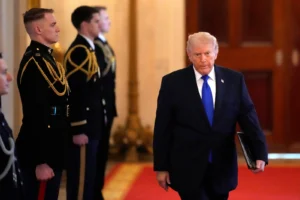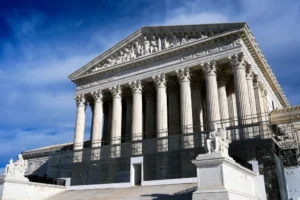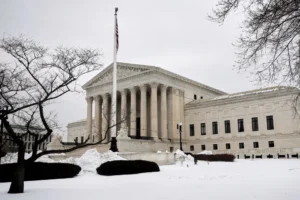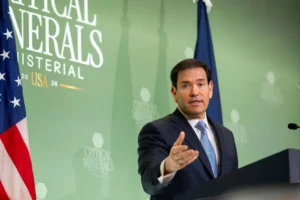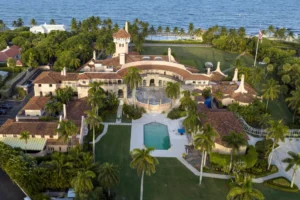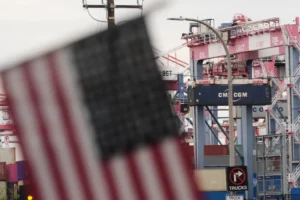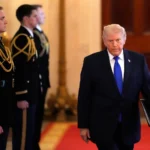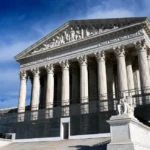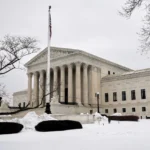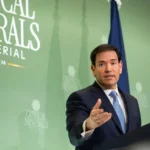Climate Activist’s Arrest in Jackson Hole Spotlights Fed’s Role in Environmental Policy
Activists disrupted an annual economic forum to highlight financial regulators’ lack of climate change actions
- Published In: Politics
- Last Updated: Sep 06, 2023
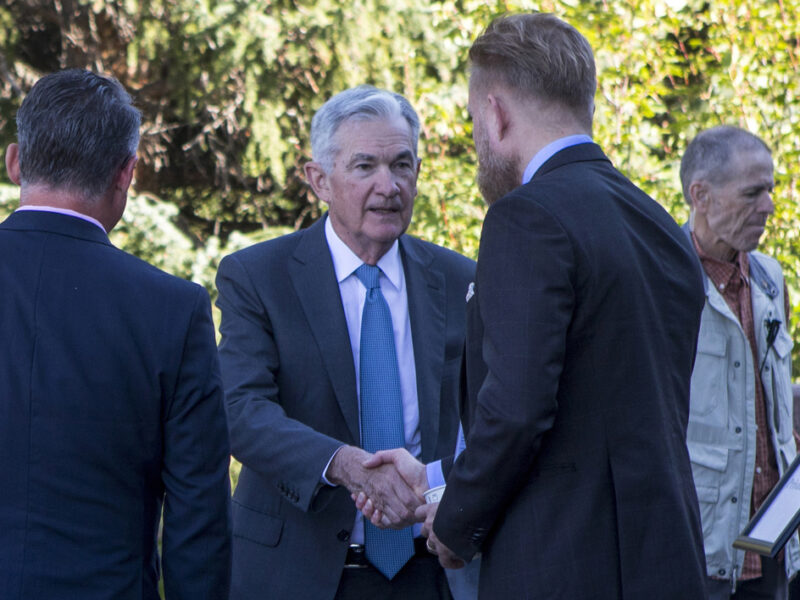
Activists have taken aim at Jerome Powell, chair of the U.S. Federal Reserve Board of Governors, who did not mention climate once in his remarks in Jackson Hole last month. (AP Photo/Amber Baesler)
By Jacob Gardenswartz
Special to the Wyoming Truth
Teddy Ogborn, 25, had no intentions of becoming an activist.
Originally from Colorado and now living in Brooklyn, Ogborn studied comparative literature in college with the goal of going into filmmaking.
But the “existential threat” of climate change propelled him to work as, in his words, a “climate justice organizer and mobilizer.” And now he’s facing up to six months in jail for his involvement in a viral demonstration at an annual meeting of the nation’s top bankers in Wyoming.
“I think sometimes it can be hard to imagine a future where I can have a family and work on my funky little videos without having to confront more and more the physical reality of a heated boiling planet outside,” Ogborn told the Wyoming Truth.
On Aug. 24, Ogborn and a group of about 15 activists with “Climate Defiance” — a new, youth-led movement employing nonviolent protest throughout the country seeking to force policymakers to decrease reliance on fossil fuels — took to the Jackson Hole Economic Symposium, where top economists and policymakers were set to discuss “structural shifts in the global economy.”
Chanting “end fossil finance,” protestors attempted to enter the main hall, only to be met by a slew of security guards. Video of the encounter — which has since racked up over a million views on X, the site formally known as Twitter — shows a guard pushing Ogborn to the ground and placing a knee on his back. Ogborn was later handcuffed and charged with Class B federal misdemeanor charges for disorderly conduct, court records show.
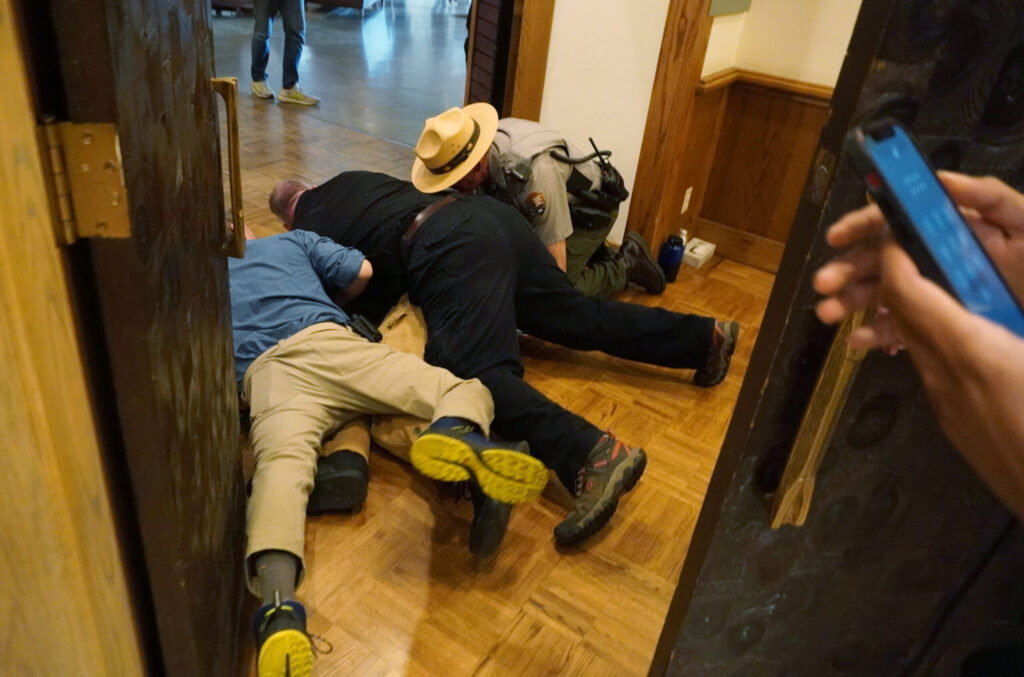
“You can see the degree to which they actually need to keep these people insulated,” Ogborn recalled of the encounter. “As young people, we simply cannot let that happen.”
Extreme weather engenders calls for greater climate action
From the climate activists’ perspective, the Jackson Hole forum represented the perfect spot for a viral disruption.
This summer, Americans have endured an unprecedented number of extreme weather events, from record heat advisories and devastating wildfires to brutal hurricanes and severe flooding.
Meanwhile, the yearly economic symposium, hosted by the Kansas City Federal Reserve, brings some of the wealthiest bankers in the world to Grand Teton National Park — home to iconic wildlife and storied natural beauty. The meeting is, as Ogborn put it, “a playground for billionaires.”
“They cosplay as cowboys, they have their little ranch, they’re flying on private jets, and in so doing they’re investing massively in fossil fuels, benefiting from the system which is destroying the natural environment that they’re coming to,” Ogborn said.
There’s no denying the power of those participating in the symposium. Financial markets and global currencies are directly swayed by attendees’ remarks.
And yet according to some experts, if the activists are looking for a tangible shift in climate policy, they may be barking up the wrong tree.
“Activists are right to call attention to the urgency of climate change, but I think they may be a little misdirected when they expect the Fed to be the prime mover on this,” said David Wessel, director of the Hutchins Center on Fiscal and Monetary Policy at the Brookings Institution.
“The Fed’s mandate is set by Congress, and they’re not going to do much more than the political establishment will instruct them to do,” Wessel explained. “The Congress has not assigned the Fed responsibility for climate change, so they’re going to move pretty gently.”
Indeed, gently did they move. During keynote remarks from Federal Reserve Board Chair Jerome Powel, the word “climate” was not uttered once. Nor were there any breakout meetings or talks about the immense financial risk of climate change.
“It is shocking that this symposium, which purports to address structural shifts in the global economy, does not include a single agenda item on the climate crisis or climate solutions,” David Arkush, director of the climate program at the progressive advocacy group Public Citizen, said in a statement.
The (unlikely) asks
So what do the climate organizers want the Fed to do?
Their most direct ask is among the least likely to come to fruition: the adoption of a “one-for-one” capital requirement for new fossil fuel investments.
The idea, backed by dozens of environmental groups, is relatively straightforward. Because the Fed’s role is to ensure stability in the U.S. economy, it can determine how much liquid capital banks must maintain.
Some climate groups want the Fed to require that for every new dollar a bank invests in fossil fuels, it keeps a dollar of its own money for any future losses resulting from climate change. In effect, this would make fossil fuel investments prohibitively costly, vastly reducing the amount of money flowing into such industries.
“This simple One-for-One rule will quickly turn fossil fuels into a highly unattractive investment, and effectively stop the financing of new fossil fuel projects,” states the One-for-One campaign’s website.
According to Wessel, that’s not going to happen: “To use the Fed’s clout to tell the banks where they should land and not lend, in general, the Fed says, ‘That’s going beyond our mandate.’”
Powell himself has said as much. In remarks at an economic symposium in Sweden earlier this year, he acknowledged that while “the Fed does have narrow, but important, responsibilities regarding climate-related financial risks… We are not, and will not be, a ‘climate policymaker.’”
What comes next
Despite Powell’s stated opposition to large-scale climate actions, activists and experts alike believe there is still more Fed officials could do to address the threat of a warming planet.
Organizers pointed to how the European Central Bank (ECB) has taken a much more active approach to climate matters, though experts note the underlying political climate in Europe enables far more decisive action there than in the U.S.
“[B]road support in the EU for climate policy and persuasive policy entrepreneurs helped push the ECB to endorse new climate-related norms,” wrote a team of scholars in a new Brookings working paper. “By contrast, domestic socio-political polarization on climate policy led the Fed to avoid the topic.”
Ogborn, for his part, urged officials to end fossil financing for “critical ecosystems,” parts of the world specifically designated as crucial to the global environment.
Even something as minor as having the most powerful banker in the nation give voice to the threat of climate change could have an impact. “The Fed chair has a very large megaphone,” Wessell noted.
The Climate Defiance activists, meanwhile, show no intention of slowing their demonstrations. They’re actively fundraising to help Ogborn with the legal costs associated with his arrest, and planning more demonstrations in the near future. He’ll be back in Wyoming on Oct. 17 for his court date.

